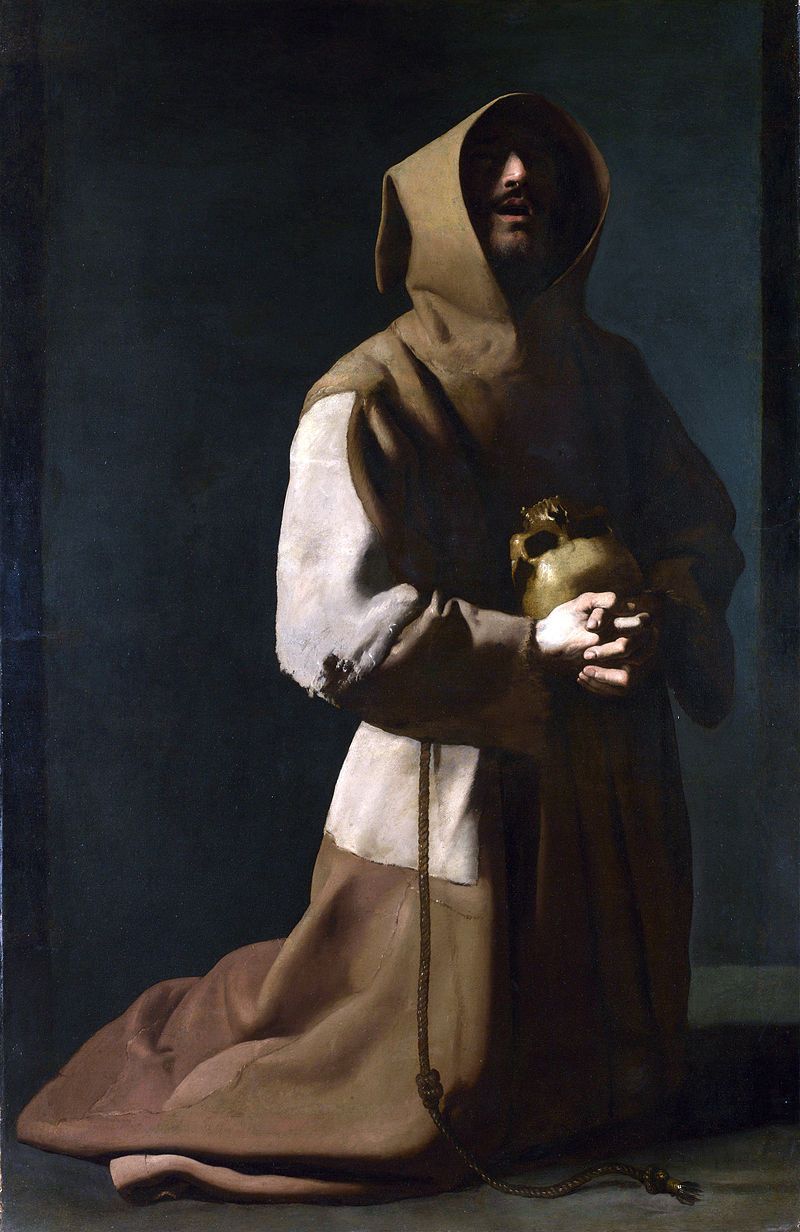
Octave of Easter
Sister Death
What does it look like to live with peace in the face of death? We can learn from the example of St. Francis of Assisi.
By the end of 1224, St. Francis was nearing the end of his life. He had received the stigmata (the wounds of Christ's crucifixion) and was was in a continual state of ill health. At this time he composed The Canticle of the Creatures (also known as The Canticle of the Sun), a hymn that personifies various parts of creation and gives praise to God through each of them. The Canticle expresses St. Francis' joy in God and his creation as well as his peaceful perseverance in suffering. We'll return to the theme of creation in the Fifth Week of Easter. For now, let's focus on the end of the Canticle:
By the end of 1224, St. Francis was nearing the end of his life. He had received the stigmata (the wounds of Christ's crucifixion) and was was in a continual state of ill health. At this time he composed The Canticle of the Creatures (also known as The Canticle of the Sun), a hymn that personifies various parts of creation and gives praise to God through each of them. The Canticle expresses St. Francis' joy in God and his creation as well as his peaceful perseverance in suffering. We'll return to the theme of creation in the Fifth Week of Easter. For now, let's focus on the end of the Canticle:
Praised be you, my Lord,
through those who give pardon for your love,
and bear infirmity and tribulation.
Blessed are those who endure in peace
for by you, Most High, they shall be crowned.
Over the course of his life, St. Francis had encountered numerous sufferings, plenty of hostility, and many obstacles But, like his Lord, he responded with patience, forgiveness, and serenity. He was even willing to withdraw from the governance of the religious orders he founded, refusing to be anxious about how they would fare without him. He was able to let go, to suffer, and to "endure in peace" because he had the peace of the Risen Christ in his heart. He was confident in the hope of the resurrection, when justice will be done, all wrongs will be righted, and the saints will receive the rewards of their labors.
Over the course of his life, St. Francis had encountered numerous sufferings, plenty of hostility, and many obstacles But, like his Lord, he responded with patience, forgiveness, and serenity. He was even willing to withdraw from the governance of the religious orders he founded, refusing to be anxious about how they would fare without him. He was able to let go, to suffer, and to "endure in peace" because he had the peace of the Risen Christ in his heart. He was confident in the hope of the resurrection, when justice will be done, all wrongs will be righted, and the saints will receive the rewards of their labors.

According to tradition, in 1226, as St. Francis literally lay on his deathbed, he added a final verse to the Canticle:
Praised be you, my Lord,
Praised be you, my Lord,
through our Sister Bodily Death,
from whom no living man can escape.
Woe to those who die in mortal sin.
Blessed are those whom death will find in your most holy will,
for the second death shall do them no harm.
Praise and bless my Lord,
and give him thanks,
and serve him with great humility.
Amen.

What amazing faith and peace! With death at his door, St. Francis knew that he could not escape from it, but this did not bother him. He even welcomed Death as a sister! Rather than being worried about himself, he charitably warned others not to separate themselves from the Lord through mortal sin. St. Francis knew that those who remain united with Christ have nothing to fear from Sister Death—what we might call the "first death." The "second death" that St. Francis mentions—eternal separation from God in hell—"shall do them no harm." Face to face with Sister Bodily Death, St. Francis blessed God for her, for she would unite the man with his Maker.
St. Francis died with the praise of God on his lips and peace in his heart. May we all die with such humility and trust!
St. Francis died with the praise of God on his lips and peace in his heart. May we all die with such humility and trust!
Grant, O Lord, that we may begin with holy fasting this campaign of Christian service, so that, as we take up battle against spiritual evils, we may be armed with weapons of self-restraint.
This collect prayer begins the Mass for Ash Wednesday, the first day of Lent. Jesus is calling us to "take up battle against spiritual evils." We'll explore fasting itself in a few weeks; during the week of Ash Wednesday, we're going to dig into an important set of weapons the Lord gives us to fight evil: sacramentals.
What's a sacramental? Well, if you attend Mass on Ash Wednesday, you're probably going to receive one on your forehead.
This collect prayer begins the Mass for Ash Wednesday, the first day of Lent. Jesus is calling us to "take up battle against spiritual evils." We'll explore fasting itself in a few weeks; during the week of Ash Wednesday, we're going to dig into an important set of weapons the Lord gives us to fight evil: sacramentals.
What's a sacramental? Well, if you attend Mass on Ash Wednesday, you're probably going to receive one on your forehead.

A Ministry of Our Lady of the Lake Catholic Church
480 152nd Avenue, Holland, MI 49424
lanecatholic@oll.org
Privacy Policy and Terms of Use
Copyright © 2026